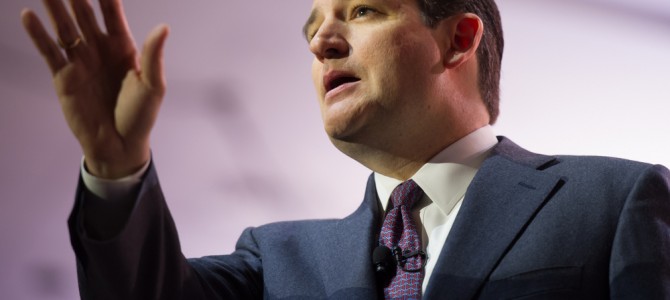
The media continue to spin the narrative that Ted Cruz is “divisive,” implying he wouldn’t be an effective president. Radio host Michael Medved, whom I respect and grew up listening to, commented just the other day that people like Cruz never become president. He said the hypothetical of a Cruz presidency was “interesting,” but Medved wasn’t convinced Cruz could be effective given the anger he tends to inspire in long-time politicians.
I respectfully disagree on both points, for several reasons.
1. Cut Through the Spin
We’ll start with Exhibit A: The Obama administration, which immediately disproves the idea that a divisive person can’t become president. Obama has been the same radical leftist from the beginning. Identity politics—slicing and dicing Americans into various groups of victims and aggressors—has always been his cornerstone.
Candidate Obama sold us on hope and change, but he has managed to be the most divisive president in modern history, pushing his identity politics (“If I had a son, he would look like Trayvon”) to the limit while demonizing and targeting opposition groups (see: Obama’s Internal Revenue Service) for humiliation and ultimate destruction.
The diehards on the left knew and approved of Obama’s divisive social-justice tactics, but he seemed like a unifying figure to the casual voters who supported him in 2008. (“There’s no red states, there’s no blue states, there’s just the United States!”) By and large, casual voters believed he would ease racial tensions, care for the working and middle classes, and raise everybody out of the recession. Hope. Change. That was the narrative.
It’s all about the story, what a candidate and his campaign project to the public, not the catfights and frenemies of DC. Admittedly, Cruz has had a poor start. His lump of clay is wobbling on its spinner and other hands are reaching out to try to shape it into something less appealing than the vessel of restoration and sanity he needs it to become.
But it’s not too late to control the spin and bat away some of the fingers scraping away at his message. Cruz doesn’t have the soaring rhetoric of candidate Obama that leads to fainting supporters, but unlikability can be overcome with good ideas and powerful persuasion behind them. As David Marcus wrote about his experience at a New Hampshire Cruz rally: “the senator from Texas makes converts through sheer intelligence and facts, not charisma. But it doesn’t make his approach any less powerful.” A critic of the firebrand going in, Marcus recalls thinking after listening to him in person, “This guy might wind up president, and that might be a pretty good thing.”
2. You Know a Man by His Enemies
It’s not all about how many friends you have. It’s also about who your enemies are. If Cruz’s “enemy” is the same as that of a large chunk of the public, then he could very well be their ally. In January, a full 80 percent of Gallup respondents said they disapproved of how Congress does its job. Many of these same members of Congress say they’re not keen on Cruz.
So some media pundits are complaining that Cruz doesn’t get along with some establishment types in an extremely unpopular branch of government? He doesn’t want to shake hands over business as usual? Heck, yes, sign me up.
Of course, that’s a narrative the Cruz campaign can be molding and perfecting: “I’m the guy the keepers of the status quo hate. I don’t go along just to get along. That’s how you know you can trust me. ”
It’s not even that Cruz’ campaign messaging is any more divisive than that of the other GOP candidates. The nature of conservatism is that it works for everyone, not just certain victim groups. Class warfare is unnecessary. Rather, Cruz’s messaging is labeled divisive for grounding itself on ideological turf a few blocks farther to the Right than that of an “electable” John McCain or Mitt Romney, and deploying the populist “Us versus Them” meme against the establishment and the cronies, instead of an economic class or ethnic demographic.
3. The Base Wants Heads to Spin
Cruz’ chief rival, Donald Trump, is immensely popular not just because he’s an outsider (Carly Fiorina and Ben Carson fit that description, too), but because he threw the PC rulebook out the window of the top story suite in a Trump hotel and walked away with a smug grin. Even in context, there’s no way to dress up “How stupid are the people of Iowa?” as a sensitive inquiry into the mental state of Iowans.
There’s some hunger out there for a mover and shaker. Many perceive that in Trump. Many voters want someone who won’t just make heads spin, but will knock ‘em together. We don’t want a pleader like John Kasich, or a middle-grounder, establishment partner like Marco Rubio has been on immigration and foreign policy.
Cruz ticks off the bipartisan politically correct crowd, not with brash proclamations and insults, but with such “outlandish” ideas as eliminating ethanol subsidies and not drafting women into combat. He could fill the role of the “upsetter” working to overturn the “Washington Cartel,” fitting his filibuster and fiery Senate speeches and his earned distaste from the beltway establishment into his narrative. Cruz, like Trump, can sweep up a pile of delegates just by kicking up a little dust.
4. Cruz’ Personality Lends Itself to Executive Office
The base wants to lay new tracks for a major change in course. Ideologically grounded conservatives want to bypass the administrative state and leave it a ghost town. Cruz’s disinclination to capitulate would help achieve that goal. When facing the rest of the world, we need a strong leader who takes foreign threats and relationships with our allies seriously. Cruz is no radical or yo-yo critic in this regard, just consistently hawkish (“carpet bombing” is a rhetorical, attitudinal statement, not an actual policy).
But it’s not just the base that Cruz needs support from. “Establishment voters” have to feel comfortable that Cruz would be a productive, constructive president who can reroute the train without derailing it. So here’s something for the establishment types that I haven’t heard pundits discuss: the vast difference between being a member of a deliberative body, where multiple members must give and take and find a majority for legislation, and being president.
Chief executives are not team players. So maybe Cruz isn’t that great at his current job, by this metric. Maybe he annoys the crap out of his colleagues. It’s apples and oranges. You’ve got to work with Congress on some level to get legislation to your desk that you’re willing to sign, but you have the ultimate position of strength. You get the final say almost all the time. A good poker face and the will to dig your heels in lends itself well to the office of the president, and Cruz has those qualities in greater supply than any of the other candidates do.
Cruz could make a solid executive based on these qualities and the extremely important fact that he is remarkably consistent compared to the other candidates, with a lifetime conservative rating from the Heritage Foundation of 98 percent. Before he entered the U.S. Senate, his record as Texas solicitor general (2003-2008) shows both efficacy and dedication to the Constitution. He presented 43 oral arguments in court, winning the vast majority, and won five of nine arguments before the Supreme Court. At the very least, critics should give him credit for picking the right battles.
Cruz is predictable on the issues. This is not Romneycare Romney, who turned around to campaign against a system modeled off the one he implemented in his own state. He’s not Kasich, who says he’s against the welfare state but expanded Medicare. He is not the unpredictable Democrat-recently-turned-Republican Trump. If the best you can sling at him is that he said he’s for “common-sense immigration reform” when he slipped a poison pill amendment into a massive not-so-common-sense immigration bill, that’s pretty consistent. When he says he’s pro-border security then says he wants to build a wall…because he’s pro-border security…that’s pretty consistent.
5. Great Leaders Aren’t Nice Guys
It should take the edge off voter anxiety over Cruz to note that nice people don’t usually make the most effective leaders. As Rob Asghar noted in Forbes, ambitious individuals are usually a little rough around the edges. People with passion for their ideas make the best leaders, not the kind, compassionate sort the gurus promote.
Running a country is not the same as running a company, but the qualities of leaders both public and private are the same. That combative streak, that truculence you find distasteful now, will be an asset later, once such a leader assumes control of a massive executive branch. It’s one thing to sweep into office on a wave of short-lived hype, like Obama, and preside over endless scandals, soaring debt, and a sprawling bureaucracy, even while stirring up dissension and divisiveness in government and across America. It’s another thing entirely to actually govern, to execute the laws of Congress faithfully, and to restore constitutionality.
Cruz’s stubborn principles lead him to push against the flow and walk upstream when more moderate types, weak at the knees and eager to please, are swept toward even bigger government. When the stream hits resistance its flow is disrupted; it ripples and splashes as it briefly divides to go around the object. That’s the sort of division, the sort of disruption, Cruz is making as he heads upstream, back toward our founding principles.









